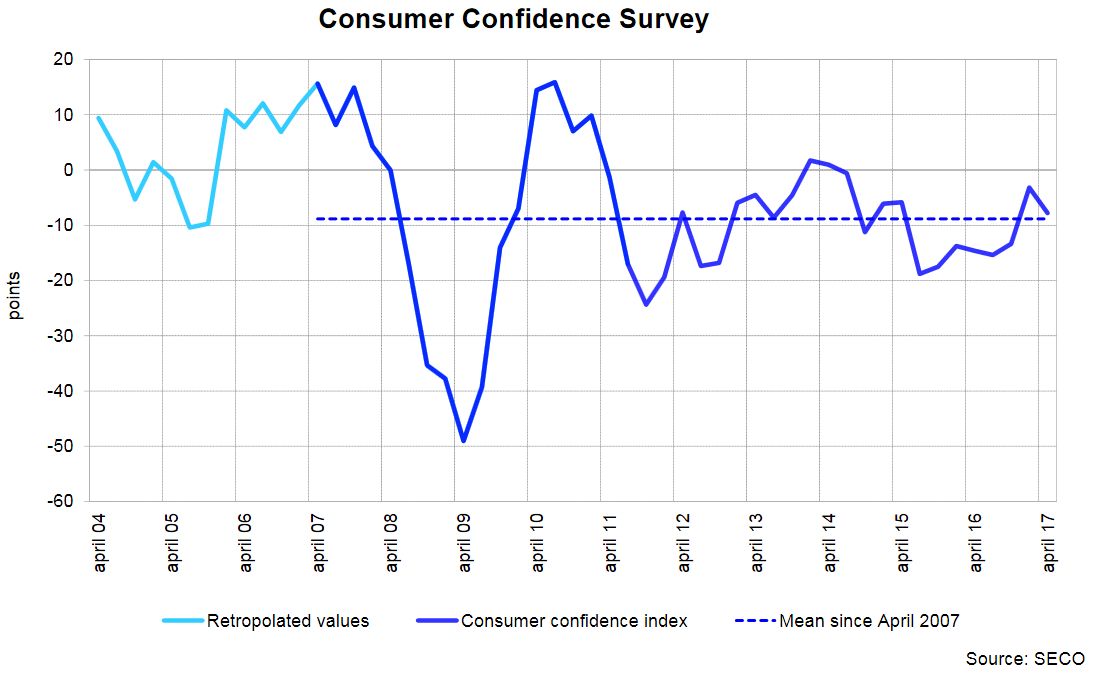Bern, 04.05.2017 – With an index value of -8 points, Swiss consumer sentiment in April 2017 is virtually at its long-term average, having been slightly more optimistic in January (-3 points). While expectations for overall economic developments are above average in April, they are less positive than they were in January. Expectations concerning the financial situation and savings possibilities of domestic households are also marginally bleaker. Compared with the last 18 months, however, consumer sentiment remains robust.
Consumer Confidence SurveyThe consumer sentiment index* from April 2017 stands at -8 points and therefore more or less at its long-term average (-9 points). This corresponds to a marginal downturn on January 2017 (-3 points), albeit at a relatively high level, with the consumer sentiment index having recorded significantly lower values throughout the six preceding quarters. In the most recent survey, consumers were gloomier about the outlook for the Swiss economy than back in January. However, although the sub-index for anticipated economic development has fallen from 14 to 5 points, this still puts it well above the long-term average (-10 points). Consumers’ responses in April to the three other questions used to calculate the consumer sentiment index did not differ significantly from the survey in January. The sub-index on anticipated unemployment remains at 48 points, meaning that the expectations for the labour market have remained close to the average (long-term average: 51 points). Expectations concerning the financial situation of domestic households have generally deteriorated slightly since January. The corresponding sub-index has fallen from 0 to -3 points and has therefore kept close to the long-term average (2 points). The question about anticipated savings possibilities was also answered somewhat less optimistically in April. Having remained at its long-term average (21 points) in January, this sub-index was slightly below this level in April at 15 points. |
Consumer Confidence Survey, Q2/2017(see more posts on Switzerland Consumer Confidence, Switzerland SECO Consumer Climate, ) |
Furthermore, households do not consider now to be a particularly good time to make major purchases. The corresponding index has fallen from 4 points in January to -6 points in April and therefore lies at its long-term average. The indices on past economic development, job security and the development of prices in the past and over the coming twelve months have remained virtually unchanged since January.
Compared to previous surveys since the appreciation of the Swiss franc in January 2015, the sentiment of Swiss consumers is robust in April 2017. In particular, the above-average assessment of the outlook for overall economic developments shows that consumers are still expecting the Swiss economy to recover. Compared with January 2017, however, they are less optimistic. Political uncertainty at an international level (e.g. the direction of US economic policy, the terms of the Brexit negotiations, and elections in Europe) and possibly also the rejection of CTR III at the ballot box back in February will most likely have contributed to this. The generally disappointing economic growth seen in Switzerland in late 2016 could also have played a role.
* The telephone survey of randomly chosen consumers takes place every January, April, July and October. Since January 2017 it has been conducted by the market research institute LINK. A total of 1,078 Swiss residents aged over 16 and able to communicate in German, French or Italian took part in the survey in April 2017. The following four sub-indices are used to calculate the consumer sentiment index: assessment of future economic prospects, future development of unemployment, and anticipated development of the financial situation of domestic households and savings possibilities over the next twelve months.
Full story here Are you the author? Previous post See more for Next postTags: newslettersent,Switzerland Consumer Confidence,Switzerland SECO Consumer Climate








































